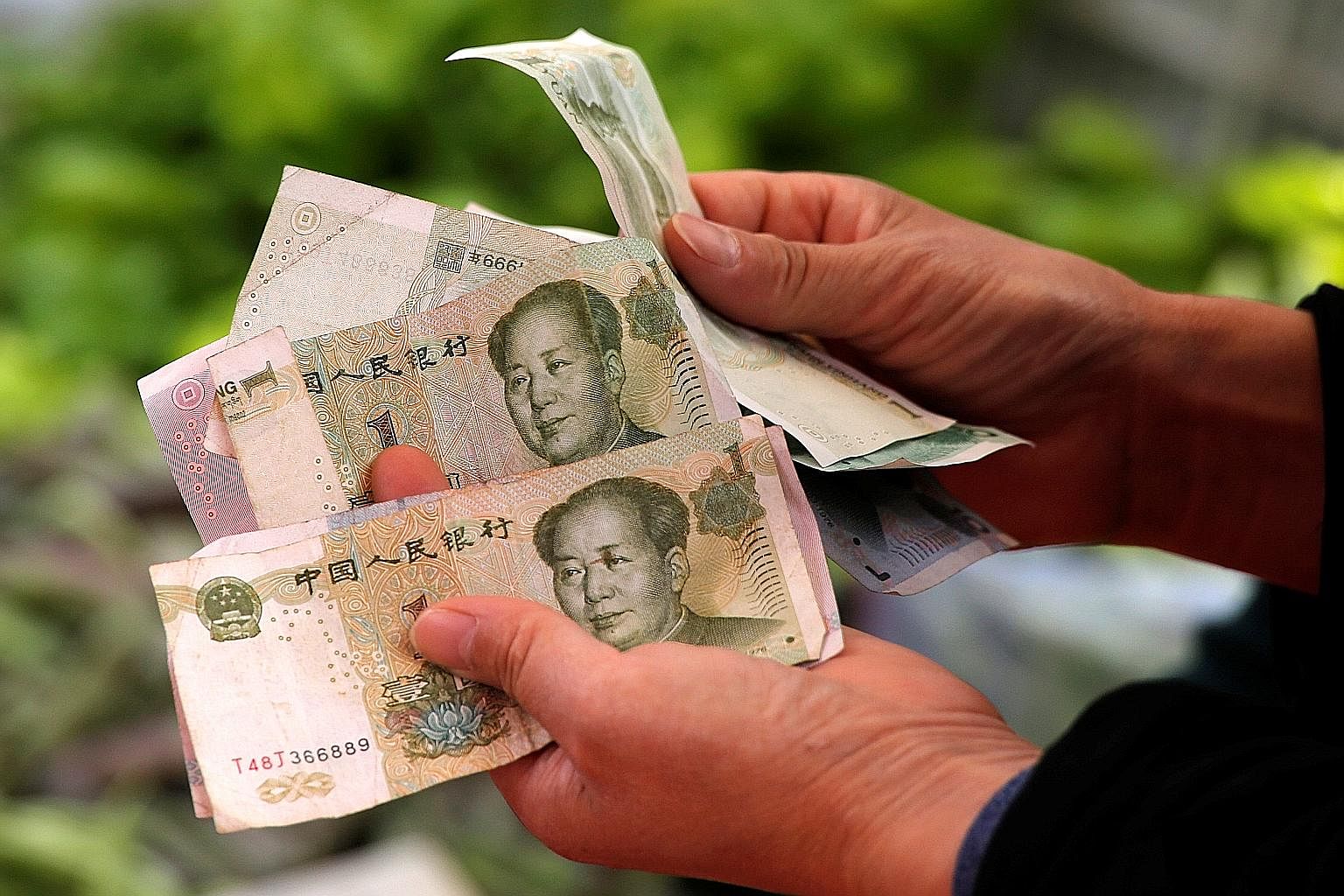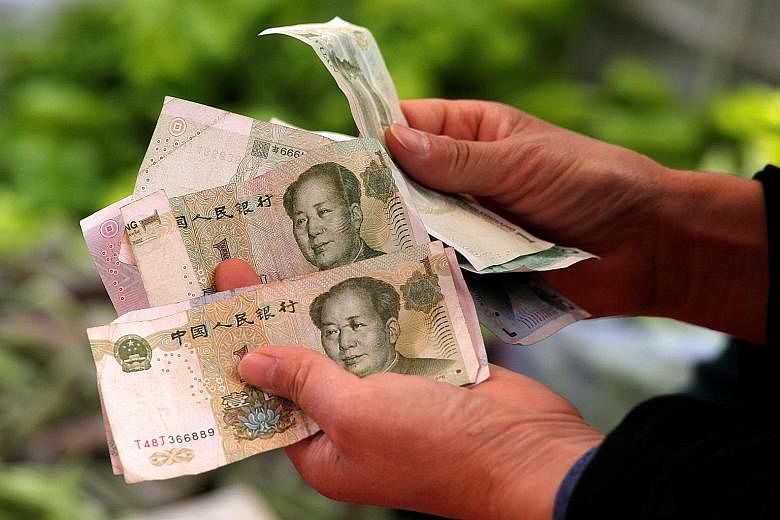China's ascent to the ranks of global economic superpowers is one of the most compelling rags-to-riches stories of our time, but its rise has hardly been smooth sailing.
In particular, as China's economic clout grows, gyrations in the country's tightly-managed currency have acquired the power to roil world markets and wipe billions off global stock prices.
Take last August when the world's second-largest economy rattled global investors with a surprise devaluation that guided the normally stable yuan down nearly 5 per cent over a week, causing its biggest one-day loss in two decades.
The move intensified fears over slowing growth in China and led to a bloodbath in currency and stock markets around the world.
Despite recent volatility and uncertainties over China's growth prospects, it is clear that the country - and, correspondingly, its currency - will play an increasingly important role on the global stage.
The Straits Times charts the yuan's rise, and takes a peek into the currency's future.

The currency's trajectory has been an impressive one and mirrors China's rise as an economic powerhouse.
Swift, which provides a financial messaging service for banks around the world, calculates that the yuan has gone from the 20th most-used currency for cross-border payments at the start of 2012 to the fifth.
Nomura Securities predicts that by 2030 the yuan will become one of the top three major international currencies - "a peer to the United States dollar and the euro as the most used currencies in the world".
China has taken a number of measures to promote the yuan's use as an international currency.
These include permitting the settlement of trade transactions with the currency, allowing issuance of yuan-denominated bonds in Hong Kong and other financial centres and letting selected banks offer offshore yuan deposit accounts.
Last year, the Chinese currency was accepted as part of the basket of currencies in the International Monetary Fund's (IMF's) Special Drawing Rights (SDR).
It joins the US dollar, the British pound, the euro and the Japanese yen in this elite club.
The SDR plays an influential role in global finance, helping governments protect their financial reserves against global currency fluctuations.
-
About The Big Quiz
-

This primer is part of The Straits Times' initiative to discuss issues of national concern. Each Monday, the paper's journalists will address burning questions in the Opinion section, offering Singaporean perspectives on complex issues.The primers, as well as five campus talks helmed by editors and correspondents, are part of this paper's outreach programme called The Straits Times- Ministry of Education National Current Affairs Quiz, nicknamed The Big Quiz.
The nationwide event, whose presenting sponsor is the Singapore Press Holdings Foundation, aims to promote the understanding of civics among pre-university students.
Yishun Junior College won the first round, held at Innova Junior College on April 6. Tampines Junior College won the second round, held at Victoria Junior College on April 20, while Catholic Junior College won the third round, held at Anglo-Chinese Junior College on April 27.
The other talks by ST journalists and quiz rounds will be held on:
• Wednesday at River Valley High School; and
•July 20 at Raffles Institution.
For more information on the quiz, go to www.straitstimes.com/tags/the-big-quiz
•For more information on the ST Schools programme and its offerings, visit www.straitstimes.com/stschools
It is also used as the basis of loans from the IMF's crisis-lending facilities.
The yuan will be introduced to the SDR on Oct 1, in a move that has been seen as a symbolic recognition of how China's economy and financial sector have evolved.
BRACING FOR A BUMPY RIDE
However, the yuan's transition to a global currency will not be a smooth ride.
Despite taking a series of steps to relax its control of the currency in recent years and allow market forces to play a bigger role in determining the exchange rate, China still keeps the yuan on a tight leash.
It sets an official midpoint every trading day, from which the currency can rise or fall 2 per cent.
However, this closely managed exchange rate will become increasingly hard to control as more funds move in and out of China.
In recent months, a torrent of capital has been flowing out of China due to worries about the slowing economy, causing the currency to weaken.
As a result, policymakers have been burning through the country's foreign reserves in a bid to hold up the sliding currency.
This has driven market speculation that China will eventually have to undertake a significant one-time devaluation to weaken the yuan, a move that should ease downward pressures on the exchange rate.
But such a step would be interpreted as a sign that the country's economic slowdown is far more severe than people think, and could result in even more money flowing out.
In fact, recent moves by Chinese policymakers to tweak the exchange rate have had disastrous consequences.
Following the shock move by the Chinese government to devalue the yuan on Aug 10 last year, the Shanghai stock market endured one of the worst one-day falls in history.
The contagion spread, and markets across the region - and as far as the US - tanked. Analysts estimate that more than US$5 trillion (S$7 trillion) was wiped out from the markets last August alone.
WHAT NEXT?
As China further opens up its capital markets, the number of transactions made using the yuan will continue rising.
The country has the second- largest stock market and third-largest local bond market in the world, which are potential targets for foreign investors.
Even as the yuan becomes more widely used, whether or not it eventually becomes a truly global currency will depend on the success of financial market reforms in China.
This boils down to whether the yuan can become a trusted "store of value" for central banks around the world - comparable to the greenback, pound, euro and yen.
China's financial markets are large but highly volatile, poorly regulated, and lack strong supporting institutions.
The country is attempting to push through challenging structural reforms to rebalance the economy towards services and consumption, as well as financial market reforms that will open it up to more foreign investment.
Meanwhile, the world can probably expect more volatility and uncertainty surrounding the yuan.
•The Primer series will be taking a break and will resume from July 11.

Have a burning question related to this week's Primer topic?
E-mail us at askST@sph.com.sg
For more information, go to www.straitstimes.com/askST


